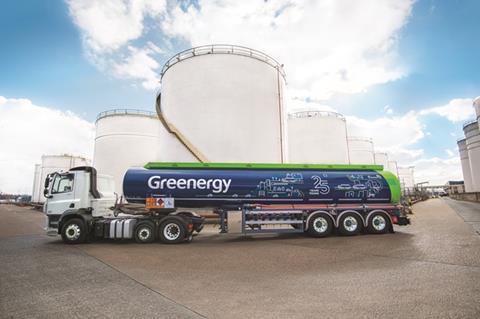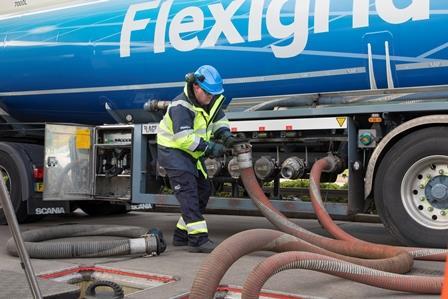
Greenergy is probably the biggest transport fuels supplier you have never heard of. While it has around 35% of the UK market, supplying 17.1bn litres of petrol and diesel last year, it operates no filling stations and its fleet of 150 tankers are usually liveried in either customer brands or that of its own fuel transport operation Flexigrid.
As part of a strategy to grow its share of a shrinking UK road fuels market, Greenergy is now directly targeting fleet operators, offering a combination of lowest cost by cutting out the middleman and consistently high service levels by controlling the supply process from end to end.
Formed 25 years ago, Greenergy supplies some of the leading oil companies which no longer have their own UK refining or import capacity, supermarket forecourts and truck and bus fleet operators for both on-site bunkering and delivery via the Keyfuels and UK Fuels fuel card networks.
It operates almost 1.4 million cu m of tank storage at nine locations around the UK, including the former Shell refinery at Coryton in Essex which is now known as Thames Oilport, and has invested more than £150m expanding its capacity in the past five years. Its total sales volumes have grown from just under 10 billion litres in 2011 to 18.6 billion litres in 2017 and its turnover was £14.9bn last year.
“While the major oil companies were exiting their infrastructure, we have been investing in it,” says Jenny Sweatman, head of Greenergy UK sales and supply. “We cover the UK from sites as far north as Clydebank and as far west at Cardiff and Plymouth.” Last year Greenergy bought Irish fuel distributor Inver Energy, which part-owns a terminal at Foynes on the west coast, and it also has a presence in Belfast to give full coverage of the island of Ireland.
Growth
While 2017 saw overall growth in demand for road fuels, with an increase in diesel consumption outweighing a small decline in petrol, Greenergy expects diesel consumption to fall this year, largely as a result of a sharp drop off in sales of new diesel cars. As alternative fuels such as gas and electric take off, this decline will accelerate; add in the economic uncertainty surrounding Brexit and it is no wonder some other fuel suppliers have less interest in investing in infrastructure.
Greenergy imports diesel from refineries around the world, especially the Middle East and Asia where large modern refineries are being built, forcing the closure of older less efficient plant in Europe.
In recent years, there has been an over-supply of diesel on world markets as production capacity expanded more quickly than demand, but since early 2016 prices have climbed steadily. Greenergy enables operators to buy fuel on spot price, fixed into the future or a combination of both as a hedge against unexpected price changes.
Greenergy is able to offer competitive prices because of its investment in import and distribution infrastructure and by running its own transport fleet based at 24 fuel distribution sites. “Our infrastructure investments and supply chain control mean we can import our own lowest-cost product and ensure supply resilience for customers,” says Sweatman. “These are both fundamental to our customer offer.”
Greenergy’s direct deliveries to on-site bunkers are increasing, partly as a result of winning new business but also because more operators are seeing the price advantage of buying their own fuel and installing yard tanks.
“A growing proportion of our volume is direct delivery into on-site tankage at bus garages, train stations, RDCs etc,” says Clare Charlton, Greenergy’s national accounts manager. “We do have a position in the fuel networks but the vast majority is delivered ourselves direct to customers’ yards.”
Most hauliers with on-site bunkers will also have one or more fuel cards for drivers to use when away from base, and while this is something Greenergy has looked at, it currently has no plans to launch its own fuel card. “For most customers the main source of fuel is their yard just because it’s cheaper,” says Charlton.

Greenergy’s other advantages are its consistently high service levels – almost 99% of deliveries are on time in full - and rapid response times, key drivers for having an in-house haulage operation employing around 400 drivers. “We in-housed because we wanted end to end control of our supply chain,” says Charlton. “With a third party we had less control and less visibility and we have expanded our transport operation as we have grown our delivered-in business. When the customer picks up the phone they are talking to someone who can see where their truck is and take direct action.”
Greenergy’s tanker fleet is all artics and most deliveries are full loads of 36,300 litres but customers can also order half loads. The company offers a managed service where it monitors stock levels and automatically reorders and delivers fuel when stocks fall to a set amount.
Flexigrid was created as Greenergy’s brand-neutral haulage operation, and only a handful of tankers are in Greenergy’s striking green and blue 25th anniversary livery, so most of the trucks can go on to other oil companies’ sites. This approach has also enabled the company to start doing third party haulage for other fuel suppliers.
Going green with biodiesel
As its name implies, Greenergy has invested heavily in renewable fuel, and is Europe’s largest producer of waste-based biodiesel, made exclusively from used cooking oil at two plants in Immingham and Teesside. It has invested in its biodiesel production facilities and says output increased by one fifth last year.
This puts the company in a strong position as changes to the UK’s renewable transport fuels obligation (RTFO) saw the percentage of road fuel that must come from renewable sources increase from 4.75% to 7.25% in April 2018. The DfT proposes to ratchet up this proportion to 9.75% in 2020 and to 12.4% by 2032, so even with overall demand for diesel fuel falling, the future for biodiesel remains bright.
Interest in running diesel trucks on 100% biodiesel has waned in the face of the dash for gas among operators wanting to cut carbon emissions and Greenergy currently does not supply any fleet with pure biodiesel.
Truck manufacturers, including Scania with its 13-litre Euro-6 engine rated up to 490hp, now produce fully warranted power plant able to run on up to 100% biodiesel, and this is an alternative route to cutting CO2 emissions rather than converting to liquefied or compressed natural gas (LNG or CNG).
“With the higher supply obligations introduced under RTFO from April 2018, the economics of supplying high percentage biodiesel blends are changing,” says Charlton. “100% biodiesel or specific blends such as B30 or B10 are now economic, and we are in a position to supply those blends today.”
Sweatman adds: “CNG or LNG requires a significant investment for operators and while it may be something they are looking at as part of their seven or 10 year plan in the short term they can achieve similar benefits with low capital expenditure by using a high bio blend.”













